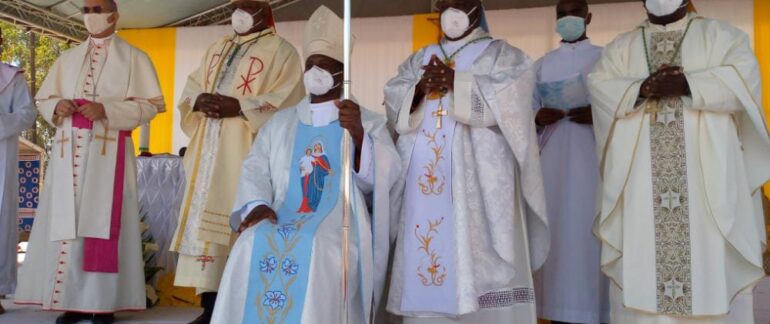Catholic Bishops issue 29th Pastoral Letter

Catholic Bishops issue 29th Pastoral Letter
6th March 2022, the Church commemorates 30 years since Catholic Bishops of the Episcopal Conference of Malawi released the Second Pastoral letter; an open letter that offered pastoral reflections on various issues of national importance. It is believed that the 1992 famous pastoral letter presided over a sweeping wind of political change, marked by the massive transition from one party era to multi-party democracy. By design, this letter gives an honest critical analysis of the social-economic and political situation of the country.
Celebrating the 30th anniversary of the 1992 historic pastoral letter, on this day the Bishops released another Letter which has been a wave causer. Titled, ‘Commemorating the 30th Anniversary of the Living Our Faith’ the letter by far deplores corruption and poor governance as vices that leave Malawians stuck in the doldrums of poverty and underdevelopment. It thus draws further from the 1992 pastoral letter to give a comparative analysis of the current social-political landscape against that of the pre-democratic era.
The letter is dissected into two parts, ‘Our Reflection on living the faith and ‘New Ills in Our Country’. The two are made up of segments that touch on various critical aspects of living including governance, human rights, health, gender equality, and education, just to mention.
On human dignity, the Letter is quite resolute and describes the present environment in which Malawians live as ‘very dehumanizing’
“Vast numbers of men, women, and children today, Like Lazarus in the gospel (Luke 16, 19-31), languishing in abject poverty while wealth and luxury are enjoyed by few who are unconcerned about these dehumanizing conditions of the majority-part of the letter reads.
The Bishops led by Most reverend George Tambala, President-Arch bishop of Lilongwe, also bemoan the widening gap between the rich and the poor, adding that the situation is worsening despite them speaking against it three decades ago. They say the growing gap is manifested by the precarious existence of the working class amid exasperating levels of bribery, and apartheid among others.
“It is regrettable that this vice which the catholic bishops condemned three decades ago have become even more deeply engrained and are tearing our society and nation apart while keeping the vast majority in the grinding poverty. If we are not careful as a nation, we are heading towards social disaster”
On the political front, the Bishops pulled no punches, describing the Tonse led government as quite irresolute and with no sense of direction. Mainly, they dwell on the divisions in the governing Tonse alliance and further attribute their disunity to the current atmosphere of social-economic uncertainty and instability. The Bishops hence warned Malawians against the tendency of delegating their responsibility of building the nation into the hands of a few powerful affluent people. They hence make a wake-up call to all Malawians to hold every one of the public office bearers into account.
In the same vein, the Pastoral letter deplored what it calls ‘a Weak and Indecisive leadership’ of the current President, Lazarous Chakwera. The Bishops say the current leadership is intriguingly slow despite having the all necessary incentives to do things better.
We Have also noted with sadness that decision-making at the highest level of government is slow despite having necessary legal powers, authority, and information. This is particularly true concerning the fight against corruption. We believe that the President will not keep any of his ministers and aides when there is sufficient evidence about their involvement in corruption.” Reads page 13 of the letter.
The office of the President and Cabinet has also been put to straight scrutiny. For example, as the letter claims, the OPC has been inefficient by stalling the operations of statutory corporations, ministries departments, and agencies with its perennial delays to offer guidance and approvals. The bishops have hence called on an urgent review of the performance and suitability of key persons in the top office in civil service.
On a positive note, the catholic Bishops have applauded the judiciary for demonstrating independence. They nevertheless appealed to this arm of government to expedite cases of corruption and ensure the promotion of fair trial and equality before the law.
Other key issues discussed in the letter include rising levels of plunder of public resources and impunity, issues of free speech and association, falling health systems, waning patriotism, and sluggish implementation of the affordable Input Programme.
The pastoral letter has been read in all Catholic Churches in the country.
